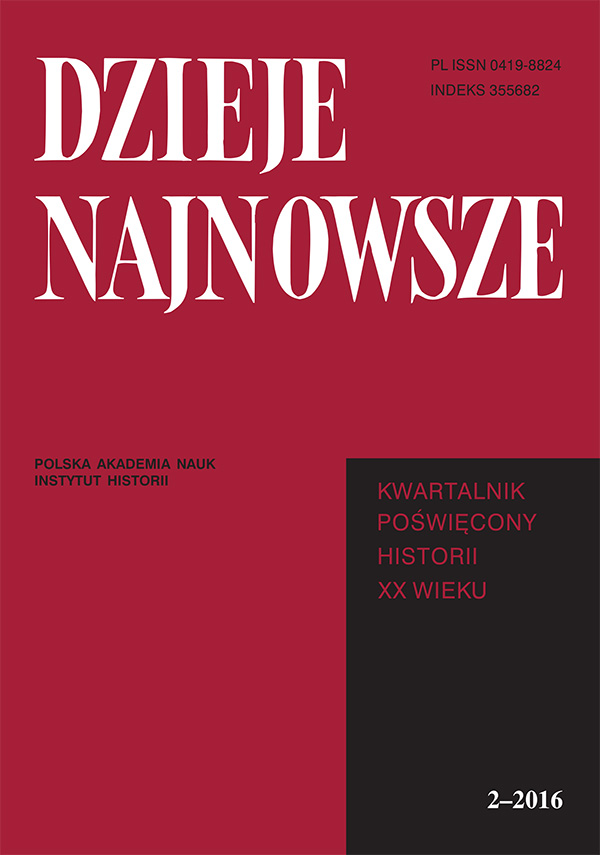Nie tylko wizyta u Stalina. Ksiądz Stanisław Orlemanski i jego bracia
DOI:
https://doi.org/10.12775/DN.2016.2.03Słowa kluczowe
bracia Orlemanscy, ksiądz, Stanisław Orlemanski, parafia, Polonia, Roosevelt, Stalin, USA, Związek SowieckiAbstrakt
Not Simply a Visit With Stalin — Rev. Stanislaus Orlemanski and His BrothersFor the past 71 years the life of Rev. Stanislaus Orlemanski has been described by a series of catchphrases, the summary of which reads — a Polish–American Communist who invited himself to Moscow, an overconfident country bumpkin who thought he could outsmart Stalin, a priest who departed without the permission of his diocesenal superior.
Reverend Stanislaus was not the most radical of the three Orlemanski brothers, who were priests, rather it was Casimir, who was deeply engaged in the Pittsburgh union movement and is well known to students of the US Labor movement. Reverend Stanislaus was known to the Polish–American community — the leading conservative paper — Dziennik Związkowy, published his articles criticizing the description of Poles and Italians in the Catholic Encyclopedia. In the ensuing years, Orlemanski’s articles appeared in both Polish and English language press.
The decision that Stanislaus Orlemanski was to travel to Moscow was made some six months prior to his departure, during the Moscow Conference of October 1943. This decision is multiplaned and relates not only to the 1944 US Presidential election, but also to a future Polish government as well as Stalin’s desire to impress both Anglicans and Roman Catholics with his openness to religion. Clearly FDR and his closest advisors saw the benefits of this proposal as did the Soviet government. Efforts to include clergy in the „Wasilewska” government also involved Fr. Walter Ciszek, SJ and Fr. Wilhelm Kubsz.
Mid–January 1944 correspondence of Ambassador Harriman with Washington relates that the People’s Commissar of the USSR had proposed that Krzycki, Lange and Orlemanski all serve as members of a future Polish government. Stalin’s late January 1944 letter to Roosevelt requesting issuance of passports to Orlemanski and Lange served as a camouflage for FDR; while his response to Stalin attempts to distance himself from the project. A passport was issued, as were permits for travel from the US Western Defense Command and the Alaska Defense Command, as well as others valid for travel through Egypt, Iraq and Persia (Iran) confirming the deep involvement of the US and British Government in this project.
Correspondence from the US National Catholic Welfare Conference to the Papal Nuncio in Washington sent prior to the departure of Orlemanski and contains specific references to his probable position in the future government. The well–publicized suspension of Reverend Orlemanski was simply pro forma and lasted but several days. Drafts of his apology are located in NCWC files. Finally, the invitation to participate in the 50th anniversary celebrations of a strongly anti–communist Cardinal of the Curia, confirm at the least, that the Vatican was aware that Orlemanski was not an agent.
What is now left to discover is the text of the Stalin document transmitted for Orlemanski by Father Marie Leopold Braun A. A., from Moscow to the Vatican and the Roman Curia’s full analysis of this document. That must await the declassification of the Pope Pius XII records held by the Vatican. What is clear is that the Rev. Stanislaus Orlemanski, although a leftist, was not a radical anomaly but rather an intensely pro–Polish US citizen who saw the sole enemy as Germany and supported any organization that fought against the enemy.
Bibliografia
Centralno–Wostocznaja Jewropa wo wtoroj połowinie XX wieka, t. I: Stanowlenije „realnego socialisma” 1945–1965, red. I. I. Orlik, Moskwa 2000.
Cienciała A., New Light on Oskar Lange as an Intermediary between Roosevelt and Stalin in Attempts to Create a New Polish Government, „Acta Polonia Historica” 1996, nr 73.
Hajkowski S., The Cultural Transition and the Attitudes of Polish Immigrant Families Towards Divorce and Parental Authority in the United States, 1931–1940, Catholic University of America 2010.
Iwanow M., Powstanie Warszawskie widziane z Moskwy, Kraków 2010.
Markiewicz P., Previously Unknown Documents and Polish Americans During World War II, „Polish American Studies” 2014, r. LXXI, t. I.
My Dear Mr. Stalin: The Complete Correspondence between Franklin D. Roosevelt and Joseph V. Stalin, red. S. Butler, Yale University Press, New Haven 2008, s. 53–68.
Pacyga D. A., Polish Immigrants and Industrial Chicago: Workers on the South Side, 1880–1922, Chicago University Press 2003.
Piątkowski L., Z dziejów lewicy polskiej w ZSRR (Polski Komitet Narodowy i Centralne Biuro Komunistów Polski), „Annales Universitates Marie Curie–Skłodowska” 2005, t. LX.
Pobrania
Opublikowane
Jak cytować
Numer
Dział
Statystyki
Liczba wyświetleń i pobrań: 732
Liczba cytowań: 0



